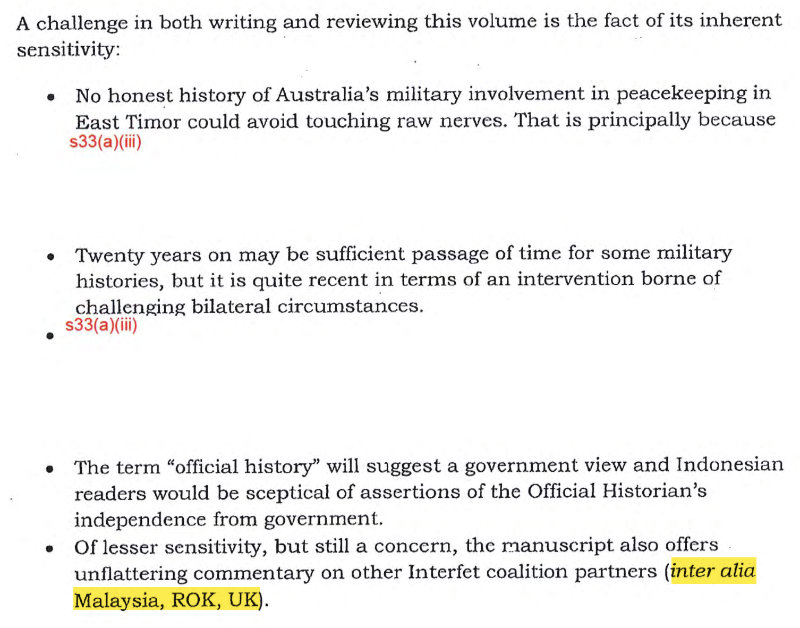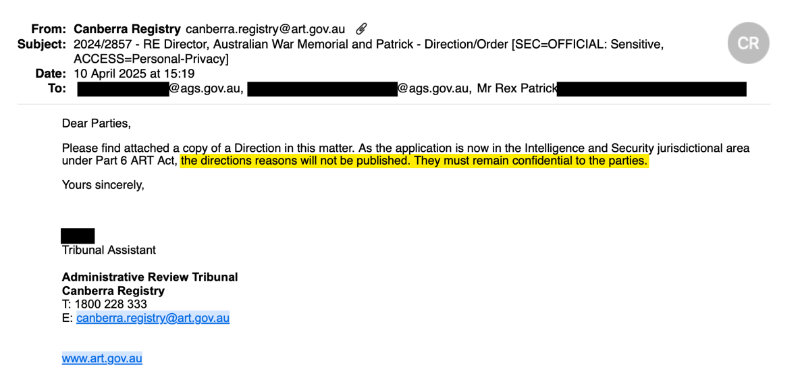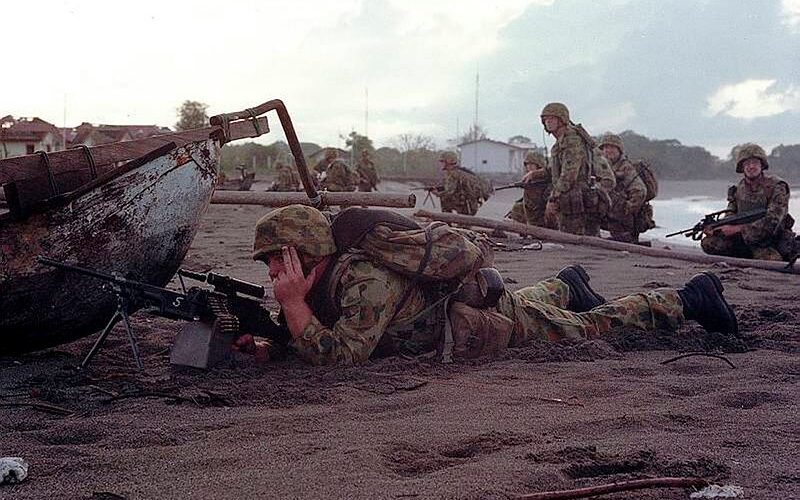The Australian War Memorial doesn’t want us to see the full history of Australian operations in East Timor, having wrapped the truth in four layers of secrecy, with even more secrecy to come. Transparency Warrior Rex Patrick reports.
It’s been like a slow-motion striptease, as bits and pieces of information about Australia’s involvement in East Timor have been released to me. It includes details about the operations of our forces with other nations, including Indonesia’s, back in the period 1999 to 2000. Some of the redacted material also relates to diplomatic strategies engaged in by the Australian government.
And it all started with Craig Stockings’ books on ‘Australian operations in response to the East Timor crisis’, books that took longer to be cleared by DFAT’s sensors than they took to write.
Neither confirm nor deny. Head officially stuck in the sand on East Timor spy scandal
After four years, I thought I had won the fight to reveal what had been censored by DFAT. On 12 April 2024, the Information Commissioner ordered the Australian War Memorial to reveal the Department of Foreign Affairs and Trade’s (DFAT) dirty laundry on East Timor.
In short, the Commissioner accepted that the information to be released would subject the Australian government to criticism, but that was not reason to withhold it from the public.
However, the Government wasn’t having any of it. Lawyers were engaged by the Australian War Memorial, and an appeal was launched in the Administrative Review Tribunal (ART). A year on, the matter has not been advanced, other than by the Government, which has successfully wrapped the proceedings themselves in complete secrecy.

DFAT Censorship extract
Secrecy quadfecta
In Freedom of Information fights, members of the public always have one hand tied behind their backs. They are not allowed to see the material that is the subject of dispute. And when secrecy is really important to Government, they can tie the other hand behind the FOI applicant’s back, too. They’ve now done that in this East Timor fight, except in a way that I have not seen before.
Their first secrecy step was to file confidential evidence and argument. Imagine a debate where one side gets to present their argument in secret; not fair obviously, but that’s what is to happen.
The government has taken a second secrecy step to add icing to the secrecy cake. The name of the person giving the secret evidence is also to be kept secret. Secret evidence from a secret person; open justice, Australian style.
I’ve little doubt that behind the War Memorial, the agencies pulling the strings here are DFAT and the Australian Secret Intelligence Service, but thanks to this ruling, that will stay in the ‘neither confirm nor deny’ zone.
When MWM first revealed this second step, the government complained to the Tribunal, but withdrew it after losing a similar complaint against me in a separate proceeding.
The secret so secret that we can’t be told its secret. What’s the scam?
Upping the secrecy ante
To further obscure the proceedings from public gaze, the government has asked the ART to move the matter to the Intelligence and Security Jurisdictional Area (ISJA) of the Tribunal. Step three complete.
I fought the third step, represented by barrister Ian Latham, acting in the public interest.. Alas, the Tribunal agreed to the government’s request and then gave open justice a fourth whack. I am not allowed to share their reasons for doing so.

Secret Reasons. Source: ART
Legal manoeuvres in the dark
I am in the Administrative Review Tribunal because the War Memorial appealed the Information Commissioner’s decision, but they’re not saying the Information Commissioner got it wrong.
Instead, having lost the case, the Government is appealing on a completely new and different ground: national security. No mention was made of national security concerns to the Information Commissioner – it’s only been raised because they lost and wanted a second bite of the secrecy cherry.
This abuse of process was pointed out to the Tribunal, but the Tribunal, itself a government organisation rather than a court, wasn’t too bothered about that.
In their submissions to move the proceedings to the ISJA, the War Memorial’s senior counsel (yes, only the most experienced and expensive lawyers will do when it comes to secrecy fights) argued, “In summary, the applicant submits it is readily apparent the proceeding involves ‘national security information’.
My barrister’s response to that was, “If it was readily apparent, a [national security] argument would have been advanced at the Information Commissioner review stage.”
The Tribunal went along with the government’s request. ‘Too bad, so sad’ for those who want an accurate, truthful account of our war operations history from the War Memorial.
The fight will go on, but sadly with little chance of winning. I can’t develop transparency arguments to secrecy arguments I can’t see. The Australian Government’s dirty secrets will likely stay in the shadows,
and no one will be held to account for the many failures and betrayals that characterised Australian policy towards East Timor for so long.
But as far as the government is concerned, that’s a perfect outcome. There was, of course, a promise made about a new era of transparency and accountability. I guess that wasn’t a core promise.
Downer and Howard’s East Timor lies. History missing in action.
Rex Patrick is a former Senator for South Australia and, earlier, a submariner in the armed forces. Best known as an anti-corruption and transparency crusader, Rex is also known as the "Transparency Warrior."

